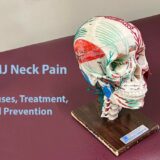fibromyalgia
Fibromyalgia (FM or FMS) is characterised by chronic widespread pain and a heightened and painful response to pressure. Fibromyalgia symptoms are not restricted to pain, leading to the use of the alternative term fibromyalgia syndrome for the condition. Other symptoms include debilitating fatigue, sleep disturbance, and joint stiffness. Some people also report difficulty with swallowing, bowel and bladder abnormalities, numbness and tingling, and cognitive dysfunction. Fibromyalgia is frequently associated with psychiatric conditions such as depression and anxiety and stress-related disorders such as posttraumatic stress disorder. Not all people with fibromyalgia experience all associated symptoms. Its exact cause is unknown but is believed to involve psychological, genetic, neurobiological and environmental factors. There is evidence that environmental factors and certain genes increase the risk of developing fibromyalgia – these same genes are also associated with other functional somatic syndromes and major depressive disorder. The central symptom of fibromyalgia, namely widespread pain, appears to result from neuro-chemical imbalances including activation of inflammatory pathways in the brain which results in abnormalities in pain processing. The brains of fibromyalgia patients show functional and structural differences from those of healthy individuals, but it is unclear whether the brain anomalies cause fibromyalgia symptoms or are the product of an unknown underlying common cause. Some research suggests that these brain anomalies may be the result of childhood stress, or prolonged or severe stress. Fibromyalgia has been recognized as a diagnosable disorder by the US National Institutes of Health and the American College of Rheumatology. Fibromyalgia, a central nervous system disorder, is described as a “central sensitization syndrome” caused by neurobiological abnormalities which act to produce physiological pain and cognitive impairments as well as neuro-psychological symptomatology. Despite this, there is controversy as to the cause and nature of fibromyalgia, as well as how patients are described by those in the medical community. Dr. Frederick Wolfe, lead author of the 1990 paper that first defined the diagnostic guidelines for fibromyalgia, has stated he believes the causes of Fibromyalgia “are controversial in a sense” and “there are many factors that produce these symptoms – some are psychological and some are physical and it does exist on a continuum.” Fibromyalgia is estimated to affect 2–8% of the population, with a female to male incidence ratio that is somewhere between 7:1 and 9:1. The term “fibromyalgia” derives from New Latin, fibro-, meaning “fibrous tissues”, Greek myo-, “muscle”, and Greek algos, “pain”; thus the term literally means “muscle and connective tissue pain”.


